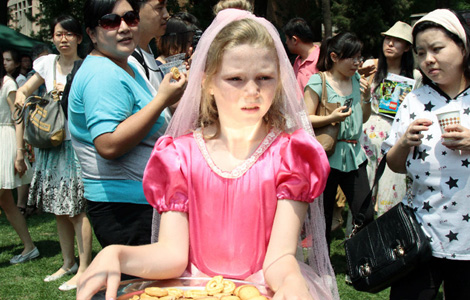Beijing expatriates caught in a smoggy dilemma
Updated: 2013-05-29 01:43
By Zheng Xin and Chen Xin (China Daily)
|
|||||||||||
Main reason
People have been coming and going in Beijing for decades. Years ago, however, that probably would have meant leaving China entirely. Not now, say recruiters.
Li Li, a senior consultant at Asia-Pacific Human Resources Co in Shenzhen, Guangdong province, said more foreigners are leaving Beijing and heading to other Chinese cities.
Professionals in areas such as management, design and accounting have gone to Hong Kong, and foreign-language teachers have moved to Shenzhen and Guangzhou, she said, citing cases she has dealt with.
"The deterioration in air quality in the capital is absolutely the main reason," Li said. "Two of my foreign friends in Beijing plan to leave for their home countries due to the smog."
However, as job opportunities emerge nationwide, expats have options.
Pedro Hernandez, a Spanish computer science student at the University of Alcala in Madrid, chose a university in Shandong province for his exchange study. The 30-year-old said he plans to find a software development job in China after graduation.
Other expats are also heading south before next winter.
"In the past, Beijing would be the first or at least the second choice for foreigners who want to find a job in China," said Yang Sha, general manager at Angelina International Placement Service in Beijing, which specializes in hiring foreigners to teach languages in Chinese schools.
"Now we find Beijing is no longer appealing and foreigners prefer to work in cities in southern provinces such as Zhejiang, Fujian and Hunan," he said.
Preston Decker, 26, from the US, left Beijing for Fujian in March, citing air quality in the capital as the main reason.
"After living in Beijing for two years, it got to the point where you ask yourself if it is worth living there and damaging your health. For a person like me with no family ties, the answer is no," he said.
Decker now works as an English-language teacher in Xiamen and said he and his fiancee enjoy the fresh air and life there.
"I think it's pretty easy to scoff at the pollution when you tell yourself that you'll only be in Beijing for a short period, but once you start thinking about staying in the city for years, the weight of possible health consequences starts to add up," he said.
Oliver Twizell, a 29-year-old designer from Britain, is also considering leaving Beijing due to concerns over the air quality. "I know there are more foreigners leaving Beijing for other cities in China this summer than in previous years," he said.
Twizell said it usually takes people six months before they move elsewhere, and he thinks July could see expat relocation reach a peak.
He said a huge difference has emerged among the expat community regarding living conditions and attitude toward Beijing compared with 10 years ago, with air quality becoming the top concern.
"You see more people bringing humidifiers to work to make the office air more manageable," he said.
Twizell is considering moving to Shanghai, where he spent six years before coming to Beijing in 2012.
Safe level
In January, dense smog and haze pushed the pollution index to a record high. The density of PM2.5, or particulate matter smaller than 2.5 microns, which is able to enter the lungs and blood stream, exceeded more than 900 micrograms per cubic meter in several districts of the capital, according to Beijing Municipal Environmental Monitoring Center.
According to the World Health Organization, the safe daily level is 25 micrograms per cubic meter.
Hospitals in Beijing have reported an increase in the number of patients with respiratory problems on days when there is heavy pollution.
Improving air quality is one of the keys to retaining talented expatriates, most of whom work in high-earning professions while making a substantial contribution to the capital's development and cultural diversity.
Saint Cyr, the doctor, said daily stress and anxiety from constantly waking up to dangerously gray skies and not being able to send your children outside takes a major toll on physical health and the immune system.
"I desperately hope dramatic steps can soon be taken to improve this situation. Everyone needs hope and a silver lining," he said.
He Wei in Shanghai contributed to this story.
Related Stories
China monitors air pollution with 'eyes' in sky 2013-04-27 01:17
Smoking, air pollution major health threats in China 2013-04-16 00:44
March 13: Beijing's air pollution 2013-03-13 18:07
Air pollution needs urgent action 2013-03-01 07:15
Air pollution prompts Beijing to limit fireworks 2013-02-01 15:41
Beijing to shut coal-fired boilers to clean up air 2013-05-27 02:59
Today's Top News
Chinese firm signs satellite deal
Beijing reports 2nd H7N9 infection
Minister chides Japan's 'lack of common sense'
All parties must work for Middle East peace
President Xi and LA mayor aim for stronger ties
Wedding banquets go smoke-free
China pledges solar action
Beijing dismisses report of cybertheft
Hot Topics
Lunar probe , China growth forecasts, Emission rules get tougher, China seen through 'colored lens', International board,
Editor's Picks

|
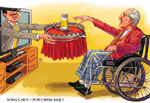
|
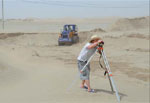
|

|
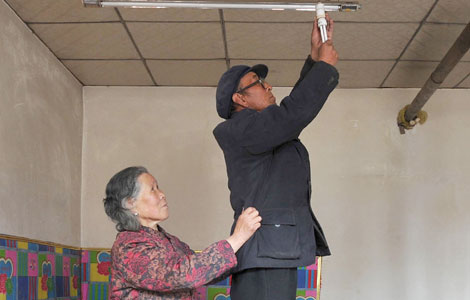
|
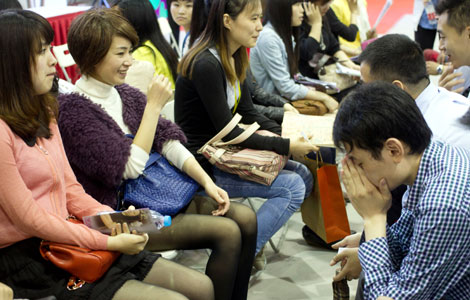
|
